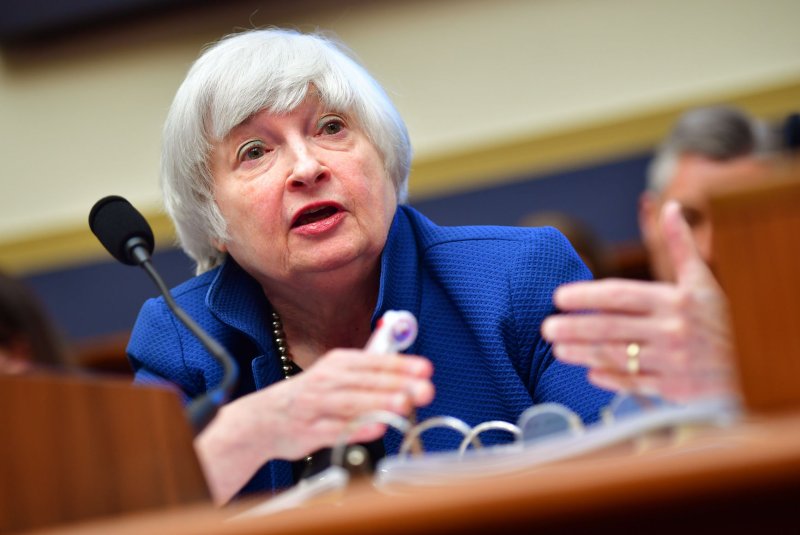Federal Reserve Chair Janet Yellen testifies on monetary policy and the state of the economy during a House Financial Services Committee hearing Wednesday in Washington, D.C Photo by Kevin Dietsch/UPI |
License Photo
July 12 (UPI) -- Federal Reserve Chair Janet Yellen told a congressional committee Wednesday that the central bank plans to keep raising its benchmark interest rate and to reduce its investment holdings.
Yellen appeared before the U.S. House Committee on Financial Services to give her semiannual monetary policy report.
The report on the economy, including jobs, inflation, exports and consumer spending, was upbeat.
Oil futures traders reacted positive to her comments as well as downward revision of forecasts for dwindling production from U.S. shale. Brent crude oil prices increased 1.6 percent to to $48.29 per barrel in morning trading Wednesday.
Yelle noted the economy added 180,000 jobs per month during the first half of this year -- nearly the same pace as last year's first half.
Also, the unemployment rate dropped to a pre-recessions level of 4.4 percent in June, from a high of 10 percent in 2010.
"It is also encouraging that jobless rates have continued to decline for most major demographic groups, including for African Americans and Hispanics," she said in prepared remarks.
The inflation-adjusted gross domestic product is estimated to have increased at an annual rate of 1.5 percent in the first quarter, and she said "more-recent indicators suggest that growth rebounded in the second quarter."
Overall consumer prices, as measured by the price index, increased 1.4 percent over 12 months through May, up from about 1 percent a year ago but a little lower than earlier this year.
The United States is benefiting from other countries' stronger growth.
Looking ahead, Yellen expects a strong economy.
Yellen said she and her colleagues on the Federal Open Market Committee "expect that, with further gradual adjustments in the stance of monetary policy, the economy will continue to expand at a moderate pace over the next couple of years, with the job market strengthening somewhat further and inflation rising to 2 percent."
She also expects further gains in U.S. exports.
"Favorable financial conditions, coupled with the prospect of continued gains in domestic and foreign spending and the ongoing recovery in drilling activity, should continue to support business investment," Yellen said.
Although the Fed plans to keep raising interest rates, Yellen gave no information on a timetable.
"The committee continues to expect that the evolution of the economy will warrant gradual increases in the federal funds rate over time to achieve and maintain maximum employment and stable prices," she said. "That expectation is based on our view that the federal funds rate remains somewhat below its neutral level -- that is, the level of the federal funds rate that is neither expansionary nor contractionary and keeps the economy operating on an even keel.
"Because the neutral rate is currently quite low by historical standards, the federal funds rate would not have to rise all that much further to get to a neutral policy stance. But because we also anticipate that the factors that are currently holding down the neutral rate will diminish somewhat over time, additional gradual rate hikes are likely to be appropriate over the next few years to sustain the economic expansion and return inflation to our 2 percent goal."
The Fed increased the interest rate for federal funds rate by 0.25 of a percentage point at its March and June meetings, bringing the target to a range of 1 to 1.25 percent.
"In doing so, the committee recognized the considerable progress the economy had made -- and is expected to continue to make -- toward our mandated objectives," she said.
Last month, central bank officials announced a plan to slowly reduce reserves by phasing out reinvestments.
But Yellen said she anticipates the balance sheet will remain larger than it was before the 2008 financial crisis. Several officials believe the Fed likely will maintain a portfolio to exceed $2 trillion.
The Fed attempted to stimulate the economy during and after the financial crisis through the purchase of Treasuries and mortgage-backed securities.
"Once we start to reduce our reinvestments, our securities holdings will gradually decline, as will the supply of reserve balances in the banking system," she said.
She concluded her remarks by saying that "the committee would be prepared to use its full range of tools, including altering the size and composition of its balance sheet, if future economic conditions were to warrant a more accommodative monetary policy than can be achieved solely by reducing the federal funds rate."
Yellen will appear before the Senate Banking Committee on Thursday.















